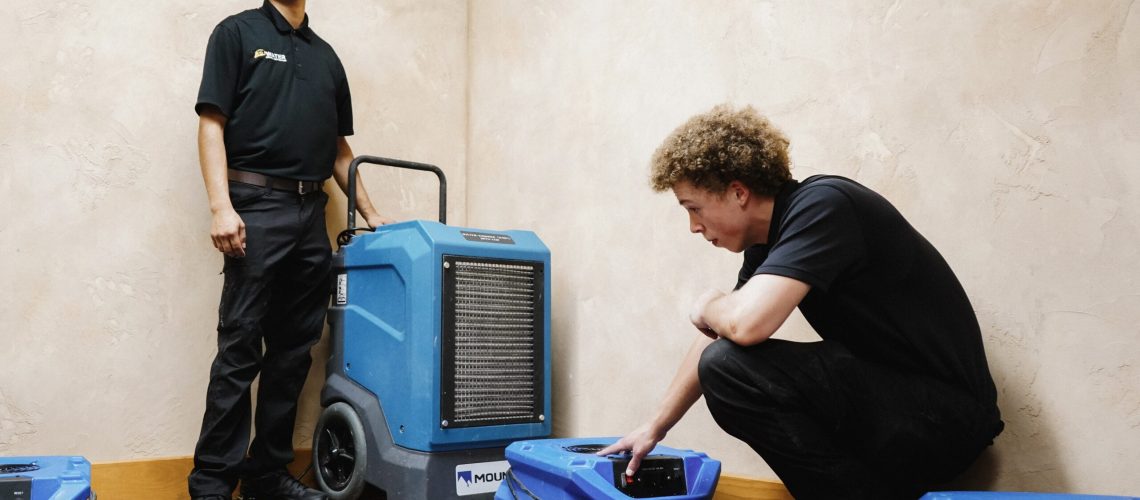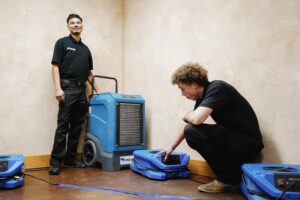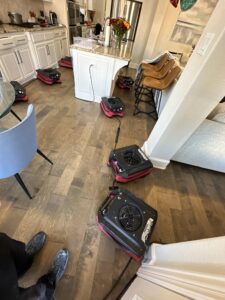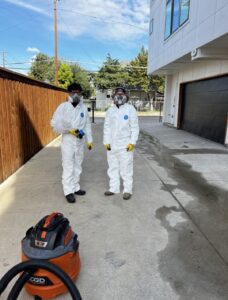Key Takeaways
- Regularly inspect plumbing for leaks and signs of wear.
- Keep gutters and downspouts clear to prevent water buildup.
- Check your roof for leaks and maintain proper sealing around windows and doors.
- Monitor your water bill for unexpected spikes that may indicate hidden leaks.
- Install and maintain a sump pump if you have a basement.
- Ensure proper yard grading and landscaping to direct water away from your foundation.
- Protect pipes from freezing in cold weather.
- Use water detection devices to catch leaks early.
- Know where your main water shutoff valve is located.
- Perform regular maintenance on water-using appliances.
- Address small signs of water damage before they become big problems.
- Have an emergency plan and contact professionals at the first sign of trouble.
Water damage is one of the most common and costly issues property owners face. Whether it’s a slow leak that goes unnoticed or a sudden flood from a broken pipe, water can wreak havoc on your home or business, leading to mold growth, structural damage, and expensive repairs. At Water Rehab & Restoration, we’ve seen it all, and we know that prevention is key. Here are our top tips to keep water damage from disrupting your life.
1. Regularly Inspect and Maintain Plumbing
One of the biggest culprits of water damage is faulty plumbing. Pipes wear out over time, and leaks can develop in hard-to-see places like behind walls or under floors. To prevent problems:
- Check for leaks under sinks, around toilets, and near water heaters.
- Look for water stains on walls and ceilings.
- Listen for running water sounds when appliances aren’t in use.
- Inspect exposed pipes for corrosion or damage.
If you notice any signs of trouble, don’t ignore them. Fix small leaks before they turn into big problems.
2. Keep Gutters and Downspouts Clear
Your gutters and downspouts direct rainwater away from your property, but if they are clogged with leaves and debris, water can overflow and seep into your foundation or roof. To avoid this:
- Clean gutters at least twice a year—more if you have overhanging trees.
- Ensure downspouts direct water at least 3-4 feet away from your foundation.
- Consider installing gutter guards to reduce debris buildup.
3. Check Your Roof for Leaks
A leaky roof is a fast track to water damage. Regularly inspect your roof for:
- Missing, cracked, or curled shingles.
- Damaged flashing around chimneys and vents.
- Water stains or mold in the attic.
If your roof is aging or showing signs of damage, it’s best to address repairs before a small issue turns into a major leak.
4. Seal Windows and Doors
Gaps around windows and doors allow water to sneak in, especially during heavy rains. Ensure a watertight seal by:
- Replacing worn-out weather stripping.
- Applying fresh caulk around windows and door frames.
- Checking for drafts and water seepage during storms.
This not only prevents water damage but also improves energy efficiency.
5. Monitor Your Water Bill
Sometimes, the first sign of a hidden leak is an unexpected increase in your water bill. If your usage suddenly spikes and there’s no obvious reason, you may have a leak somewhere in your plumbing system. A professional can help locate and repair hidden leaks before they cause serious damage.
6. Install a Sump Pump (and Test It Regularly)
If your property has a basement, a sump pump can be a lifesaver in preventing flooding. But a sump pump only helps if it’s working properly. To keep it in top shape:
- Test it every few months by pouring water into the pit to ensure it activates.
- Keep it clean and clear of debris.
- Consider a battery backup system in case of power outages.
7. Be Smart About Your Landscaping
The way your yard is graded affects how water flows around your property. If water pools near your foundation, it can lead to leaks and structural issues. To prevent this:
- Ensure the ground slopes away from your home or business.
- Use gravel and mulch strategically to help absorb rainwater.
- Avoid planting trees with invasive roots near plumbing lines.
8. Protect Against Frozen Pipes
In colder climates, frozen pipes can burst and cause significant water damage. To prevent this:
- Keep your home heated to at least 55°F in winter.
- Insulate exposed pipes, especially in basements, attics, and exterior walls.
- Let faucets drip slightly during extreme cold to keep water flowing.
9. Use Water Detection Devices
Smart technology can help catch leaks before they become disasters. Consider installing water sensors in:
- Basements and crawl spaces
- Near water heaters and washing machines
- Under sinks and behind toilets
These sensors can alert you to leaks, giving you time to act before significant damage occurs.
10. Know How to Shut Off Your Water
Every property owner should know where the main water shutoff valve is located. In an emergency, turning off the water quickly can prevent extensive damage. Locate your shutoff valve and make sure everyone in your household or business knows how to use it.
11. Maintain Appliances Properly
Washing machines, dishwashers, water heaters, and refrigerators can all develop leaks. Regular maintenance includes:
- Checking hoses and connections for wear and tear.
- Replacing old hoses with stainless steel braided ones.
- Cleaning out lint traps and drain lines to prevent backups.
12. Don’t Ignore Small Signs of Water Damage
Even small stains, musty odors, or minor peeling paint can be early indicators of water problems. Investigate any signs of moisture before they become larger issues. Mold can grow quickly in damp areas, leading to potential health hazards and costly remediation.
13. Have a Plan for Emergencies
Despite all precautions, water damage can still happen. Be prepared by:
- Keeping important documents and valuables in waterproof containers.
- Having an emergency contact list, including a plumber and water damage restoration service.
- Knowing your insurance coverage and ensuring it includes water damage protection.
14. Call a Professional at the First Sign of Trouble
If you suspect water damage, don’t wait. The longer water sits, the worse the damage becomes. At Water Rehab & Restoration, we specialize in fast, effective water damage mitigation.
Final Thoughts
Preventing water damage takes effort, but it’s well worth it compared to the stress and expense of dealing with a major issue. By taking proactive steps—like regular inspections, proper maintenance, and smart technology—you can protect your home or business from costly repairs and disruptions. If you ever find yourself facing water damage, Water Rehab & Restoration is just a call away, ready to get your property back to normal as quickly as possible.





